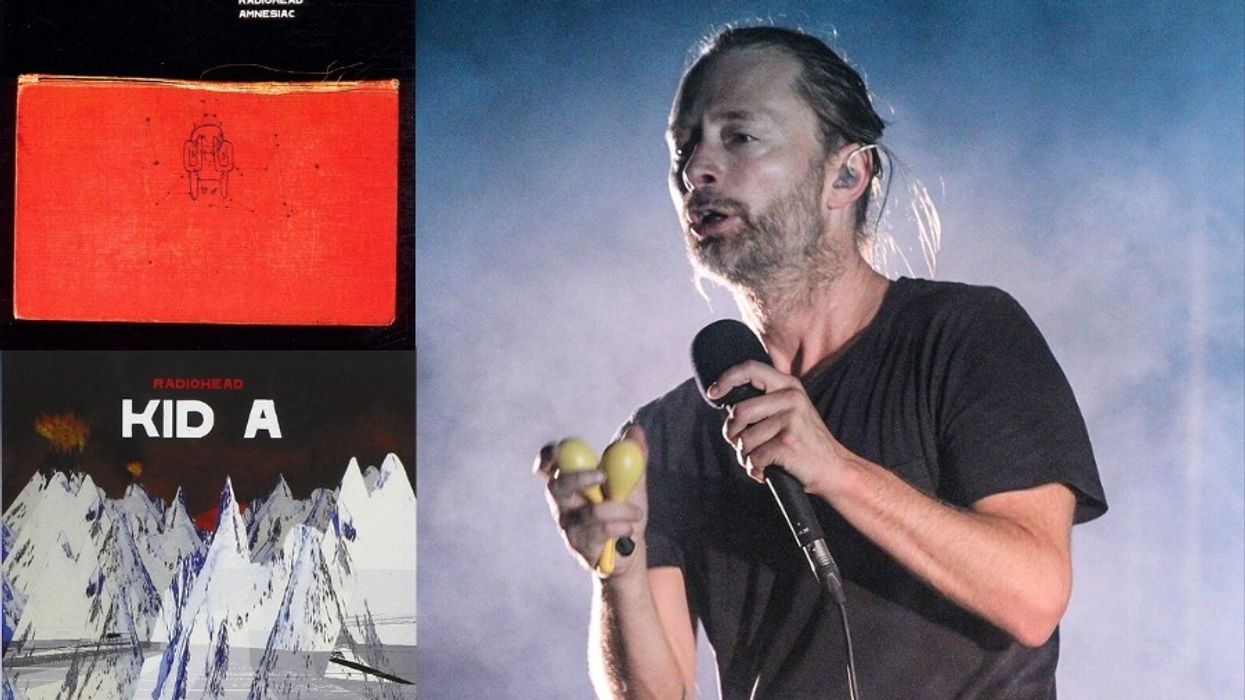Ever since the breakout success of 1992's "Creep," a soul-baring ode of alt-rock self-loathing, many of Radiohead's harshest critics—and, frankly, even some of their biggest fans—have labeled the band's music "depressing." Perhaps most on-the-nose is a Sputnik Music assessment of 2000's Kid A: "[It] is a dark, paranoid and disturbing album, plucked from the annals of Thom Yorke’s tortured mind," they wrote. "It is cold, distant and enigmatic. It is also emotive, powerful, and depressing." As Newsweek reported in 2017, an analytics specialist even attempted to calculate a "gloom index" from Radiohead's songs. (Their most depressing track was apparently 2016's "True Love Waits.")
It's easy to understand that description given the frequent bleakness of Thom Yorke's lyrics and the intoxicating iciness that colors much of the band's post-2000s work. But it's also not a very nuanced take, especially when you factor in the role of real-life depression for many songwriters. In a 2003 fan Q&A, hosted by Musique Plus during the promotion of Radiohead's sixth album, Hail to the Thief, Yorke was asked, "How does mental health impact your music?" And his response was insightful, particularly given that public discourse surrounding depression wasn't as normalized then as it is decades later.
- YouTube www.youtube.com
"One of the things I find most offensive about what people say about our music is when they say it’s 'depressing,'" he said. "The reason I find it offensive is that to me implies that to suffer from depression is like being subnormal. There’s a stigma, but there shouldn’t be because there’s an awful lot of people that suffer from depression. And it shouldn’t be something that’s like an ultimate swear word because I suffer from it and a lot of people suffer from it, and it should be something that’s openly discussed and accepted."
Yorke describes how depression naturally informs his creative process because it's something he can't turn off like a light switch: "I have to make music sometimes when I’m in that frame of mind because I suffer from it." But in an interesting shift in perspective, he argues that sometimes it isn't suffering. "Sometimes it's a bonus," he says. "But sometimes it is a mental illness, and it means I have empathy with other mental illnesses because sometimes I feel that I’m close to certain…trap doors, as I once called them, that I could fall through. I really have a problem with people who dismiss art or music on the grounds that it’s 'depressing.' A lot of creative power is from that feeling."
- YouTube www.youtube.com
That's a beautiful way of putting it. For artists with depression, it's possible that their struggles will manifest in their music, and what some label as "depressing" others may describe as profound or cathartic. Who among us hasn't listened to a dark, downcast song and walked away feeling purged or less alone? That said, Radiohead's catalog is also more emotionally nuanced than some people give them credit for—in 2019, Yorke told The New York Times Magazine, "Even in the darkest parts there is, I hope, some humor."
- YouTube www.youtube.com



















 Volunteers who drive homeless people to shelters talk with a person from Ukraine in Berlin on Jan. 7, 2026.
Volunteers who drive homeless people to shelters talk with a person from Ukraine in Berlin on Jan. 7, 2026.
 Leonard Cohen performs in Australia in 2009.Stefan Karpiniec/
Leonard Cohen performs in Australia in 2009.Stefan Karpiniec/  Enjoying a sunset.Photo credit
Enjoying a sunset.Photo credit 
 An envelope filled with cashCanva
An envelope filled with cashCanva Gif of someone saying "Oh, you
Gif of someone saying "Oh, you
 Counterintuitively, social media can make you feel more bored and lonely.
Counterintuitively, social media can make you feel more bored and lonely. Talking about what you’ve read can add a social dimension to what can be a solitary activity.
Talking about what you’ve read can add a social dimension to what can be a solitary activity. 
 A flight attendant closes the overhead binCanva
A flight attendant closes the overhead binCanva Gif of Larry David trying to put his luggage in overhead compartment via
Gif of Larry David trying to put his luggage in overhead compartment via 
 Dog owner pets their dogCanva
Dog owner pets their dogCanva Gif of a sad looking pug via
Gif of a sad looking pug via 